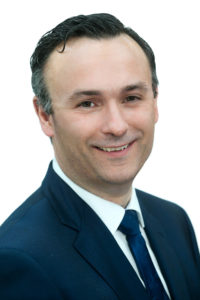There is something of an overlap with the newer role of Chief Digital Officer, he says, in areas such as business intelligence. “There is a connection there with marketing and also the use of external data. Very often it’s about enhancing the client experience through digital means. But it is an evolving role and to that extent something of a grey area.”
New focus
But it is certainly not a grey area to Michael Downes, chief digital officer of Uniphar. “I was previously CIO and we changed the title to reflect a new focus after the completion of a major SAP and ICT transformation project two years ago. The need for leadership then was to completely renew our systems, which were largely outdated legacy and bespoke systems. Today the need is for leadership and innovation in data and digital and new 21st century opportunities.”
The focus now is, Downes says, on “what we do not do that we could do, with advantage to our customers and the business. My work involves taking an idea, shaping it up and putting it in a plan, then starting to deliver it in a way that works. There are in fact lots of ideas from across this business, so it is a question of people drawing up business cases, establishing priorities and a road map and making it happen.”

My experience in client companies is often that the lines are blurred because the roles have grown as much in reflecting the individual person’s personality and abilities and interests as in any thought-out strategy. I certainly know quite a few CIOs who have effectively taken on the Chief Data role as well, reflecting their professional calibre and competence, David McGee, PwC
In the recent past the emphasis has been on helping Uniphar’s retail customers with supply chain integration and smart new business intelligence capabilities. “For example, we take all of their sales and dispensing data up into the cloud, anonymise and analyse it. Then we push it back to the individual customers benchmarked against their peer group. So now the participants know, for example, that they are in the top 10% for say generic drugs but perhaps in the bottom 10% for customer retention.”
Individual insights
“It can go down to individual baskets and product mix so you can see that some pharmacies are much better at cross-selling. You can see patterns like most baskets that contain product A will also have product B, which is in some way complementary. So that is a valuable lesson to pharmacies that tend only to sell product A. We have a team of business development people who will go out to the individual pharmacies armed with this information and help to train staff. They can even set up messages or prompts in the EPOS systems.”
Downes says that over 80% of orders now come online but Uniphar is about to launch a full B2B e-commerce platform. “We will have all of the products and brands up, with supporting information in a comprehensive dynamic catalogue. There will be complete self-service functionality for ordering but also for credit/debit notes, returns and in fact every aspect of their business dealings with us.”
Distinct roles
A management consultant’s view of the top ICT roles comes from David McGee of PwC, who believes firmly that the CIO, Chief Data and Chief Digital Officers are three distinct roles that are evolving very rapidly. “At the same time, my experience in client companies is often that the lines are blurred because the roles have grown as much in reflecting the individual person’s personality and abilities and interests as in any thought-out strategy. I certainly know quite a few CIOs who have effectively taken on the Chief Data role as well, reflecting their professional calibre and competence.”
If you were designing an organisation from scratch McGee believes the three roles should be split. “But they don’t all necessarily have to have that ‘Chief’ in the title. On the other hand, my belief about the Chief Digital role is that it does need the authority because you could not do that job effectively unless you were the CEO or very close to that level. The organisations that are really going through digital transformation are seriously re-inventing themselves as organisations and making themselves digital throughout.”
“Remember that ‘paperless office’ concept? Still just a vision. Over the last two decades and more, we have been using the Internet and smart technology and all that but in many respects we have simply put a pretty front end on existing processes — not all of them electronic even today,” said McGee. “How would you be a disruptive start-up in your business sector, with no baggage or legacy? That’s the kind of question a Chief Digital Officer should be considering because he or she is leading into the future.”
Data Czar
On the other hand, McGee is quite clear that there should be a ‘data czar’ somewhere in the organisation but not necessarily at the C-suite level. “Data in most organisations is largely an in-house resource that certainly has to be well managed. But look at manufacturing. It has for decades had MRP and ERP and SAP and Oracle and constant responsibilities of master data management to ensure all data was clean, reliable and robust. That was accomplished between IT and production or operations without a Chief Data person.”
But McGee is also firm in the view that data is the oxygen of business. “There is really no such thing as a non-tech business in today’s world and there is a role for a Chief Data Officer in some organisations and sectors. Some businesses are heavily data-led, and that’s when the role is important in harvesting and analysing the data. But once again, what rank that function should have will depend completely on the particular organisation.”







Subscribers 0
Fans 0
Followers 0
Followers